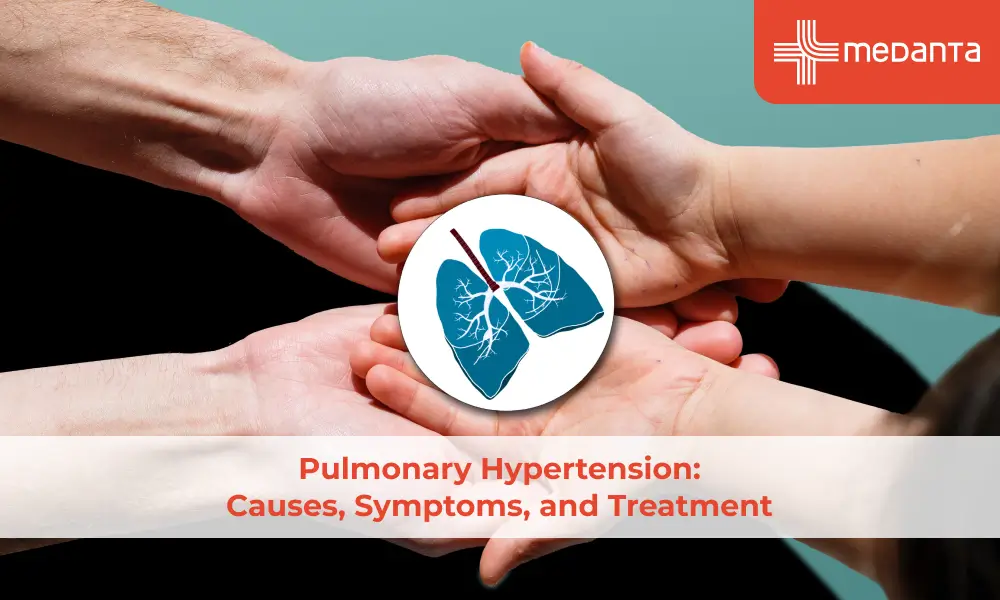Pulmonary Hypertension: Causes, Symptoms, and Treatment

TABLE OF CONTENTS
- What causes pulmonary hypertension?
- How is pulmonary hypertension classified?
- Who is most at risk of developing pulmonary hypertension?
- What are the symptoms of pulmonary hypertension?
- What are the complications that can come from pulmonary hypertension?
- How is pulmonary hypertension diagnosed?
- How can pulmonary hypertension be treated?
Did you know that all the blood that reaches back from your body to the heart has to pass once through your lungs before it gets pumped again? This means your lungs handle as much volume of your blood as your whole body in a given time. When arteries that take this unoxygenated blood received from the rest of your body to your lungs start failing, it causes the flow to reduce and the pressure to increase inside the arteries against which your right heart has to pump. The extra effort slowly starts affecting your heart muscles as well. In some people, this can keep getting worse and can become dangerous. However, in most cases, treatment can help in reducing discomfort.
What causes pulmonary hypertension?
Just like in the case of your blood pressure, factors causing pulmonary hypertension may be multiple, including genetics. In many cases, it is hard to pinpoint the exact cause and doctors call it idiopathic pulmonary hypertension. However, the presence of other conditions can also lead to pulmonary hypertension. These include:
Clotting of blood in the lungs
Heart Failure (Congestive)
Liver diseases like cirrhosis
Autoimmune diseases like lupus
Birth defects in the heart
Lung diseases like chronic bronchitis, fibrosis, and emphysema
Sleep apnea
Cocaine and Methamphetamine misuse
HIV
How is pulmonary hypertension classified?
Pulmonary Hypertension is divided into 5 groups:
Group 1 - Pulmonary Artery Hypertension (PAH)
Group 2 - Caused by a disease of the left side of the heart
Group 3 - Caused by lung disease
Group 4 - Caused by blood clots
Group 5 - other causes like blood disorders, tumors, and kidney disease
Congenital heart problems like Eisenhower syndrome
Who is most at risk of developing pulmonary hypertension?
Usually aged between 30 and 60
Family history of the condition
Being overweight
Clotting disorders
Asbestos Exposure
Heart diseases
High altitude living conditions
People who take selective serotonin reuptake inhibitors used for depression
What are the symptoms of pulmonary hypertension?
When pulmonary hypertension begins, it may not show any symptoms. As it progresses, it starts affecting your ability to exercise or do daily activities. Eventually, it may worsen to the point where breathing becomes difficult at rest as well. In more advanced cases, other symptoms include:
Bluish change in lips or skin
The feeling of chest pain or pressure
Fainting or feeling dizzy
Racing heart
Swelling in ankles, legs, or tummy
Pain in the upper right side of the stomach
The feeling of low energy
Less hunger
Symptoms may be classified based on the severity, based on WHO’s functional classes:
Class 1 - No symptoms
Class 2 - No symptoms while resting, but discomfort in routine activities
Class 3 - Difficult to do normal tasks
Class 4 - Symptoms even at rest
What are the complications that can come from pulmonary hypertension?
Enlargement of the right side of the heart because of having to pump against higher pressure, eventually leading to its failure
Blood clot formation in the lungs
Irregular heartbeats
Coughing up blood because of bleeding into the lungs
Complications for pregnancy
How is pulmonary hypertension diagnosed?
Pulmonary hypertension is difficult to detect early because either it has fewer symptoms when it starts or it mimics symptoms of other heart and lung conditions. Your doctor will perform a physical examination on you and may also ask you for some additional tests like:
Blood tests (to determine the cause)
Chest XRay (to image the heart, lungs, and chest)
ECG (to check your heart)
Echocardiogram (to visualize the cavities of your heart and the flow of blood)
Catheterization of the right heart (usually done to confirm after an Echocardiogram. This allows your doctor to measure the pressure on the right side of your heart)
CT scan, MRI tests to study the lungs and heart
Lung function test - Airflow test
Sleep study
Perfusion scan - to look for clots in the vessels
How can pulmonary hypertension be treated?
There is no permanent cure for pulmonary hypertension. The approach is to slow the progression of the condition, remove any causative agents and relieve symptoms, and improve lifestyle. Any treatment suggested by your doctor will need long-term follow-up and compliance with recommendations.
Your doctor may advise you to take some medications to help. These may include:
Blood vessel dilators - either taken by mouth or injected by inhalation
Medicines called GSC stimulators that increase nitric oxide in the body
Medications to increase blood flow
Medications that relax muscles in the blood vessel walls
Blood thinning medicines
Medicines to support your heart
Medicines that cause the removal of more water from the body
Oxygen therapy may be recommended
If medications fail to control the symptoms of pulmonary hypertension, your doctor may recommend a surgical option, such as an atrial septostomy (creating a connection between the upper left and right side of your heart) or a transplant. Surgical methods have their risks and so, your doctor may recommend them only when the benefits outweigh the risks.
Some recommendations for lifestyle correction that can aid recovery include:
Rest often
Appropriate exercise or activity program
Stop smoking
Avoid high altitudes
Manage weight & nutrition






